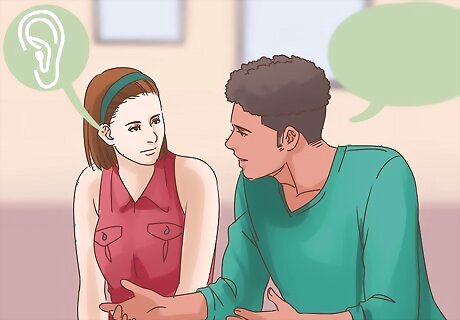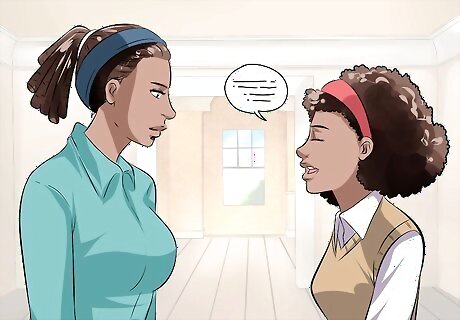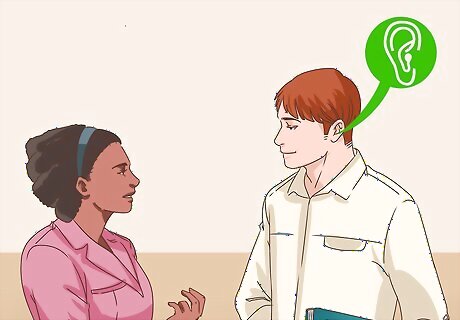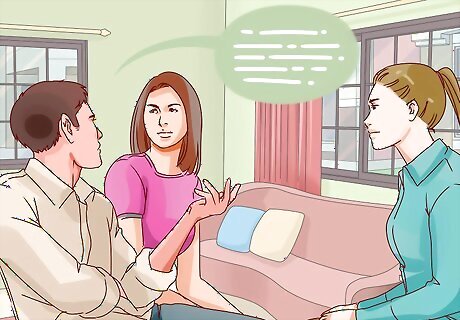
views
Having things to talk about

Try writing down all the things you want to say to other people. This helps you to gain confidence and have a ready repertoire of things to say to keep the conversation going. Some of the things you could talk about include the weather, your studies/work assignments, recent achievements, places visited, movies seen, news stories of relevance or something you have in common with the person. Seek to make people laugh. Whether it's asking where your cell phone is when you're holding it or saying something wrong accidentally (or so they think), people like somebody who makes them laugh. Prepare yourself in advance by writing down and memorizing a few jokes. Or, find other fun things to share, such as stories about silly things that have happened to you.

Teach yourself to listen well. Remember that a lot of conversation is about encouraging the other person to do the talking, so be ready to listen carefully and act as a sounding board, feeding back summaries of what the other person has said to you.

Talk to people you know and trust to gain more tips. If you're nervous about talking to new people, ask your friends and family about what to say, and what to do if you say the wrong thing. Your friends and family won't mind you asking for tips on what to say to people.
Practicing to be heard

Practice. If you are shy and want to talk to people at school or work, it's important to practice the skill of talking to others. It's a good idea to practice on a family member or a friend, somebody you have total trust in and who is willing to help you.

Talk loudly enough so that people can hear you. This doesn't mean yelling; it just means not whispering or speaking inaudibly. If you whisper when you talk, no one will hear you. Talk in an appropriate tone of voice; don't whisper or yell. If you know very outgoing people, they tend to be very loud and clear when they're talking, and sometimes like shouting, too. Reading aloud helps to talk loud and clear.

Work through your nerves. If you get nervous when you're talking, it's okay! Even though you feel like it is the end of the world when you say something you didn't mean to say, you can just try harder the next time you talk to the person.
Talking to others when out and about
Be confident. When you're talking to someone, aim to be confident. To be more confident, use the things you've planned to help you know what to say, don't worry about sounding banal or repetitive––most chit chat is anyway. Also, it's okay to fake feeling confident––confidence comes with practice.
Getting out of your “comfort zone” and gradually taking more social risks, such as talking to people and initiating conversations can be great way to build social confidence.

Listen. Being not shy isn't just being an annoying chatterbox, it's making conversation with people, and conversation involves multiple voices. Talk more and don't always be silent. Get into a conversation with people and engage in some genuine, meaningful back-and-forth.

Get to know people. Many shy people are known as loud and talkative with their friends, but strangers think they're quiet and shy. To fix that, make strangers your friends. At shops and restaurants, smile and say thank you to the waiter, or shopkeeper. At school, you can just say something like "Hey, I'm [insertnamehere]" to make friends.

Get into friendly arguments. If everybody is talking wildly about loving cats, and you don't love them, start a friendly argument by saying "That's not true!" and pretending (but clearly pretending) to be angry.

Compliment people. Honestly saying you like their earrings or something is going to make them think of you as friendly.

Make it evident that you dislike attention if you feel too much of the spotlight has fallen onto you during a group conversation. This doesn't mean cowering and throwing the attention to someone else, it means saying things like "Why is everybody looking at me all of a sudden?" or "Not sure why I've attracted everyone's attention but I know you've all got other things to add!". Be polite, humorous and friendly when you try to turn the attention away from you.

Use the typical shy person's existing humility to make yourself more approachable. Couple this with self-deprecating humour. Laughing and saying "I should have won that because I'm amazing at making a mess/doing the worst job better than anyone else!" when you failed at the thing you're talking about is good fun. Obviously, don't brag about things.
Caring for your shy self

Be gentle with yourself. Talking to others is hard for many people, and shy people have it even harder. If you also have social anxiety, high sensitivity, you get overwhelmed easily by crowds/noise/lots of talk, and so forth, you have a lot of things to contend with. As such, it's really important to not beat yourself up about the inability to hold lengthy conversations with others. It may just never be your strength, and that's okay. Short and sweet conversations with most people will be just fine. The people who really care about you will be willing to give you the space needed and the time to calm your thoughts and express them more deeply. When you're talking to someone and you don't say the right thing don't beat yourself up about it. Try to relax and go with the flow. When you beat yourself up about saying the wrong thing you feel more pressure and will eventually mess up again.

Revise things that didn't go as you hoped. Shy people can sometimes suffer from verbosity in the strangest of ways, such as talking too much about one topic, or bragging without meaning to, or gossiping in place of saying what they truly think they believe in. Such things happen out of nerves, embarrassment and a desire to fit in. They're not who you really are but you do need to address them if you make such slip-ups, to practice replacing such tendencies with more fruitful, less self-absorbed and more honest conversation instead. Once again, don't beat yourself up about it; use the experience to learn from and get it right next time.

Hang out with quieter, more thoughtful people. You may want to be friends with the popular, loud person, but people like that tend to be wild and expect you to scream and be crazy all the time. And if you don't, they'll say you're very shy. You will not feel comfortable around them. Make friends with people who listen, like similar things as you, and are capable of having a serious conversation. And that involves talking to shy people just like you.

















Comments
0 comment